Moderator Lester Holt under scrutiny during debate
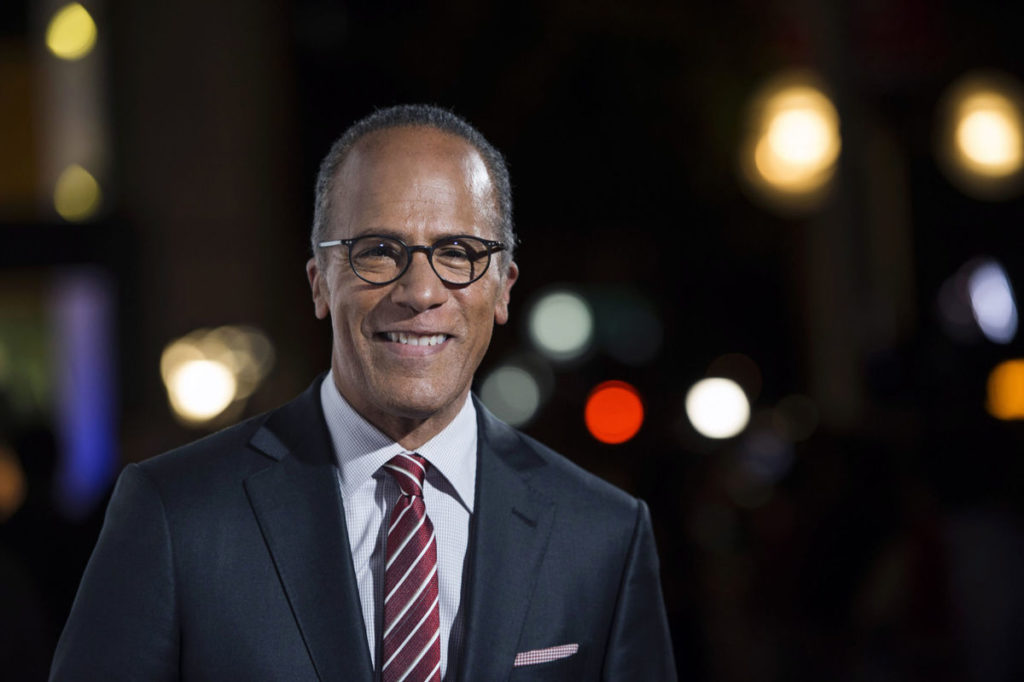
Everyone’s aware of the stakes for Hillary Clinton and Donald Trump during the first presidential debate, but there’s a third person in the equation who faces a different pressure: Lester Holt. The NBC News veteran is moderating his first general election debate, making him solely responsible for the questions asked each candidate and for steering the conversation. His performance will be closely watched, particularly in light of a dispute over the extent to which he should call politicians out for making untrue statements. Holt, 57, has kept quiet about his preparations. The NBC “Nightly News” anchor took over his job last year after predecessor Brian Williams was found to have lied about his role in news stories. Like the moderators for all three presidential debates this fall, it’s Holt’s first time in that role for a general election debate. He hosted a Democratic primary forum in January, and has interviewed Clinton and Trump three times each during the campaign. In a reflection of the attention that will be paid to Holt, his voter registration became an issue last week. “Lester is a Democrat,” Trump said in a Fox News Channel interview. “It’s a phony system. They are all Democrats.” Holt, however, is a registered Republican, according to New York state voting records. Asked about the misstatement on Monday, Trump campaign manager Kellyanne Conway said on MSNBC that it wasn’t a lie because Trump didn’t know Holt’s voter registration. Voting records show that Anderson Cooper of CNN, who is moderating the Oct. 5 debate, is registered unaffiliated with a party in New York and Chris Wallace of Fox News, the moderator on Oct. 19, is a registered Democrat in Washington, D.C. Martha Raddatz, who will join Cooper, lives in Virginia, which doesn’t register voters by party, and ABC would not discuss her affiliation. That illustrates on a small scale the issue of to what extent moderators, and journalists covering the debate, should point it out when a candidate says something untrue. It became part of the pre-debate discussion when Holt’s NBC colleague, Matt Lauer, was criticized for not confronting Trump earlier this month when the Republican falsely claimed he had not expressed support for the war in Iraq during a forum between the two candidates. The Clinton campaign says moderators should police false statements. Trump’s campaign says it’s not their role. Among journalists, there’s no consensus. Janet Brown, executive director of the Commission on Presidential Debates, said on CNN Sunday that in past debates moderators have generally believed the candidates should call their opponents out when something false is said. “I don’t think it’s a good idea to get the moderator into essentially serving as the Encyclopedia Britannica,” Brown said. Television networks were skittish Monday in discussing their fact-checking plans in advance. None admitted in advance to plans of flashing graphics onscreen to identify a false statement; that hasn’t been done in the past. NBC News said it is teaming with PolitiFact for digital fact-checking. CBS said it will assign fact-checkers that will provide context during the debate on the CBSNews.com website. In past years, some networks have assigned reporters post-debate to examine the accuracy of particular statements. The television industry will be watching to see if Monday’s debate can smash the previous record for the biggest presidential debate audience, the 80.6 million people who watched the only debate of the 1980 campaign between Jimmy Carter and Ronald Reagan. The most-watched debate this century was the first between Barack Obama and Mitt Romney in 2012, with 67.2 million voters, the Nielsen company said. During his television journalism career, Holt has been known more for hard work than flashiness. He was a news anchor in Chicago for 14 years before coming to NBC in 2000, and logged long hours on MSNBC during the Iraq War. The bass guitar is his off-screen passion. Last week he set aside debate prep to play during a Manhattan rooftop party for “Dateline NBC,” joining some fellow NBC employees running through songs by Alabama Shakes, Billy Squier and Jefferson Starship. Republished with permission of the Associated Press.
What’s on Hillary Clinton’s to-do list before Election Day?
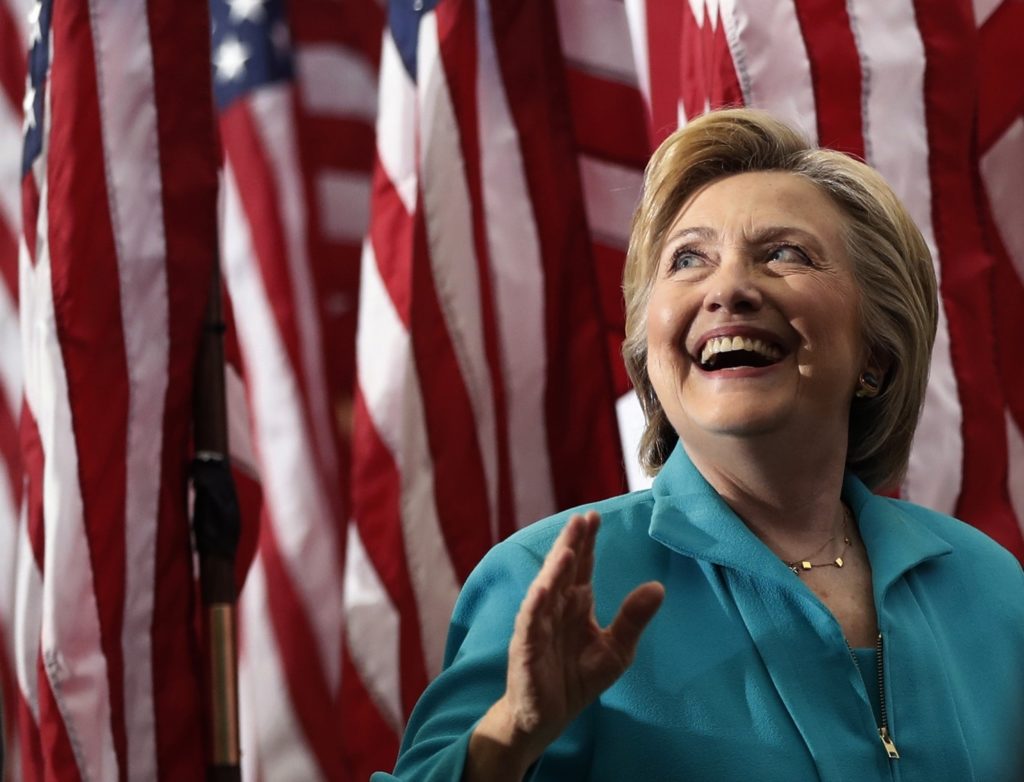
Hillary Clinton will celebrate Labor Day with an edge over rival Donald Trump in any number of the most competitive states, even as she struggles with the challenge of sealing the deal with large groups of voters who consider her dishonest and untrustworthy. Clinton’s experience as secretary of state and her handle on domestic policy make her the favorite in three presidential debates beginning later this month. She has appeared in more than 30 as a presidential candidate in 2008 and 2016. But she still has work to do. A look at Clinton’s Labor Day to Election Day to-do list: DOMINATE THE DEBATES Millions of voters will watch the debates, which offer her an opportunity and a challenge. She needs to prepare for a candidate who’s the most unpredictable nominee in decades. She also needs to prevent Trump from using the televised forums to present himself as a plausible commander in chief, and from turning them into referendums on President Barack Obama’s two terms and Clinton’s decades in politics. Clinton acknowledges that the debates could be pivotal. She told donors last weekend, “Somebody said to me, ‘Well, remember, there’ll be a lot of people watching.’ One hundred million people watching. And 60 million will be paying attention to the campaign for the first time.” CHART A PATH TO 270 Clinton has an edge in most of the highly contested states, the roughly dozen or so where the election will be decided. Her campaign is trying to keep open as many paths as possible through those states to reach the decisive 270 electoral votes needed to win. She enters the fall with a decided advantage, both in terms of history and in this year’s campaign. If Clinton can hold onto the set of states that every Democratic presidential nominee has won since 2000, she starts with 242 electoral votes. Beyond those states, preference polls show her ahead in Virginia and Colorado, and competing in close contests in North Carolina, Florida and Ohio. Applying pressure on Trump, Clinton is advertising in GOP-leaning Arizona and in an Omaha, Nebraska, congressional district. If Clinton can keep open as many routes to victory, she will make it difficult for Trump to chart a way to 270. That will make it hard for him to convince fellow Republicans who are worried about maintaining their congressional majorities that he can win. EXPECT THE UNEXPECTED Clinton’s campaign is bracing itself for some type of ‘October surprise” — an unexpected event that requires the nominee to adjust in the pressure-cooker of the campaign’s final days. Clinton must be able to deftly deal with such a development, and there are plenty of contenders on the horizon. The State Department is expected to release some of the 15,000 emails from Clinton’s time there that have yet to be made publicly available. WikiLeaks has threatened to release more damaging information before the end of the election. She’ll need to make sure any new revelations don’t further damage the public’s view of Clinton, which isn’t particularly strong for a candidate seen as ahead on Labor Day. TURNOUT, TURNOUT, TURNOUT Clinton’s campaign needs to maximize voter turnout among members of the “Obama coalition” — the legions of black, Latino, unmarried women and young voters who powered him to two decisive victories. Trump has sought in recent days to turn around his dismal standing among minorities. But the negative tone of the campaign could dampen turnout and make Clinton’s task more difficult. Clinton also aims to make the most of early voting in a number of critical states, replicating a strategy that worked well for Obama. She will have plenty of help: Obama and Vice President Joe Biden are hitting the road on her behalf and she can also rely on her husband, former President Bill Clinton. TRUSTWORTHINESS Questions about Clinton’s honesty and trustworthiness have dogged her throughout the campaign and she can ill afford to have more voters view her in a negative way. Her saving grace during the campaign has been Trump’s high negative ratings, untrustworthiness and penchant for saying provocative things that have turned off many voters. But more revelations about her private email server or the Clinton Foundation could reinforce the perception that she’s not trustworthy. On Friday, the FBI released notes from its investigation of her email use as secretary of state. It’s the kind of day Clinton needs to avoid. Even if she wins in November, this is a problem could haunt Clinton in the White House. That’s why she needs to start chipping away at her trust deficit now, so that if elected, she will have some public goodwill as she tries to lead the nation and work with Congress. Clinton could find it difficult to enact her agenda if questions about her honesty linger as president. Republished with permission of the Associated Press.
Divided America: Diverse millennials are no voting monolith

America’s oldest millennials – nearing 20 when airplanes slammed into the World Trade Center – can remember the economic prosperity of the 1990s, and when a different Clinton ran for president. The younger end of the generation – now nearing 20 – can’t recall a time without terrorism or economic worry. Now millennials have edged out baby boomers as the largest living generation in U.S. history, and more than 75 million have come of age. With less than three months to Election Day, the values of young Americans are an unpredictable grab bag. What they share is a palpable sense of disillusionment. As part of its Divided America series, The Associated Press interviewed seven millennial voters in five states where the generation could have an outsized influence this fall. They are a mosaic, from a black Nevada teen voting for the first time to a Florida-born son of Latino immigrants to a white Christian couple in Ohio. These voters illustrate how millennials are challenging pollsters’ expectations. “Millennials have been described as apathetic, but they’re absolutely not,” said Diana Downard, a 26-year-old voting for Hillary Clinton. “Millennials have a very nuanced understanding of the political world.” Just 5 percent of young adults say that America is “greater than it has ever been,” according to a recent GenForward poll. The first-of-its kind survey of young people between the ages of 18 and 30 was conducted by the Black Youth Project at the University of Chicago with the Associated Press-NORC Center for Public Affairs Research. Briana Lawrence, a 21-year-old videographer and eyelash artist from the South, wants America to return to what it was. A recent North Carolina Central University graduate, she’s voting for Clinton. She was just 7 on Sept. 11 and the aftermath of the attacks is the only time she remembers the nation feeling united. “My biggest hope for this country is for us to come back together as a community,” she said. That’s hard when people like her begin adulthood thousands of dollars in debt. Economic issues are huge with this group, since many are saddled with student loans and struggle to find jobs. Only 8 percent of millennials feel their household’s financial situation is “very good,” according to GenForward’s poll. Brien Tillett, who recently graduated from a Las Vegas high school, is 18. He was only 10 when the recession hit. His single mother was hospitalized for months after a car accident and, with no safety net, the family struggled. National debt is his top concern. As a black man, he’s turned off by some of Donald Trump‘s remarks, but likes the Republican’s aggressive economic stance. He also considered voting for Clinton, but is angry about her use of a private email server while Secretary of State. Unsure at first, he recently decided on Clinton. Anibal David Cabrera wouldn’t think of voting outside his party. The son of a Honduran mother and Dominican father, he graduated from college in 2008. He was a finance major, but the economic collapse dried up jobs. Now 31 and living in Tampa, Florida, he finally found an accounting position at a small firm. He feels he’s entering the prime of his life a few steps behind, through no fault of his own. He’s backing Trump and prays the candidate keeps promises and boosts the economy. “That is something my generation has kind of never seen,” he said. Shared pain doesn’t lead to shared views. Millennials’ disdain for traditional party affiliation means that half describe themselves as independents, according to a 2014 Pew Research report – a near-record level of political disaffiliation. They tend to be liberal on social questions such as gay marriage, abortion and marijuana legalization. Yet they skew slightly conservative on fiscal policy and are more in line with other generations on gun control and foreign affairs. Trip Nistico, a recent Colorado law school graduate, is a gun rights advocate who visits shooting ranges – but also supports in same-sex marriage. He backed President Barack Obama in 2008 and Mitt Romney in 2012. The 26-year-old is voting for Trump this year. Still, Trump remains unpopular among millennials and nearly two-thirds of Americans between the ages of 18 and 30 believe the Republican nominee is racist, according to GenForward’s poll. Views of Hillary Clinton also were unfavorable, though not to the same extent. Bill and Kristi Clay, parents of two young boys and devout Christians from rural Ohio, have struggled to pick a candidate who matches their values. Kristi Clay opposes same-sex marriage and abortion and names those as her top issues. Yet the 32-year-old school librarian reluctantly leans toward Clinton, because she feels Trump is materialistic and prefers the Democratic views on immigration and poverty. Though she and her 33-year-old husband are feeling “pessimistic” about this election, both say they will vote anyway. Whether their millennial brethren do the same is unknown. Some are disenchanted that progressive Bernie Sanders, who ran against Clinton in the Democratic primary, is out of the race. The millennial vote rose steadily beginning in 2002 and peaked in 2008. In 2012, however, just 45 percent of millennials cast ballots and participation has leveled off or dropped since, said John Della Volpe, director of polling at Harvard University’s Institute of Politics. “They have a somewhat different perspective in terms of politics,” he said. “It hasn’t really worked. They haven’t been part of a movement that’s been effective.” Republished with permission of the Associated Press.
Donald Trump and new team have little time to execute new strategy

Donald Trump is on the clock. He has about 80 days to reset and rally a presidential campaign that’s done little but stagger since the close of the Republican convention. The GOP nominee’s allies say the celebrity businessman and his new leadership team are “laser-focused” and ready to direct the billionaire’s venom against Democratic Hillary Clinton. “This has been one of the best weeks the campaign has had,” said Sean Spicer, chief strategist at the Republican National Committee. For much of the past year, Trump has ignored the tools of modern-day presidential campaigns. That’s a big reason why Trump’s Republican critics are skeptical their party’s nominee has the time or discipline to rescue his struggling White House bid. “The Trump campaign is at a ludicrously high disadvantage,” said Dan Senor, a former adviser to 2012 GOP nominee Mitt Romney and House Speaker Paul Ryan, R-Wis. “The Democrats have something that the Republicans don’t: They have a nominee that’s built a real campaign organization.” While Trump did bring in a new set of advisers in the past week, it appears all but certain his comeback strategy cannot benefit from the proven building blocks of winning campaigns, especially when compared with the structure Clinton has assembled. Trump has few loyal staffers devoted to his election working in the tightly contested states that will decide the election; little early investment in the data operation needed to help ensure his supporters vote; and no significant effort to take advantage of early voting, which begins next month in some states. If not for the Republican National Committee’s staff, Trump would have a skeleton presence in the most competitive states. Only in the past week did Trump place his first round of general election advertising — nearly $5 million for TV commercials in Florida, Ohio, Pennsylvania and North Carolina. By contrast, Clinton’s campaign has spent more than $75 million on ads in the weeks since she effectively locked up the nomination in early June, according to Kantar Media’s political ad tracker. Out of time to build a campaign to match Clinton’s, the team at Trump Tower will by necessity focus on a broad messaging effort to capture the attention of voters and try to highlight Clinton’s shortcomings. For now, Trump finds himself behind Clinton in preference polls in nearly every battleground state. “This new team will be very, very aggressive. They understand the nature of taking on the left,” said former House Speaker Newt Gingrich, a Trump ally. “They will be on the attack.” That team includes Stephen Bannon, a combative conservative media executive with no presidential campaign experience, and pollster Kellyanne Conway, who has known Trump for years. The campaign chairman, Paul Manafort, resigned on Friday amid scrutiny of his past work for Ukraine’s former pro-Russian political leaders. Bannon and Conway will have money to work with. In July, Trump raised more than $80 million for his campaign and allied Republican Party groups, his campaign has said. That’s just shy of the $90 million that Clinton’s aides said the nominee collected in July for her campaign and fellow Democratic committees. The goal for the Trump campaign’s leaders is not to tame the candidate’s passion, according to Trump’s allies, but refocus his attacks on Clinton. The hope is that Trump can avoid the missteps that have defined his campaign since the end of the conventions, including a public feud with an American Muslim family whose son was killed while serving in the military in Iraq. “Unfortunately, it took them two months to figure out that Donald Trump is Donald Trump,” former Trump adviser Barry Bennet said of Manafort and his team. “He’s the bulldozer candidate. What you need to do is aim him at an immovable object, not try to change him.” That approach was evident Friday. Trump began with a visit to flood-wreaked Louisiana and ended with a measured, but pointed rally in Michigan. He took on Clinton and her strong support among African-Americans, and contended that his rival would rather give jobs to refugees than American citizens. Trump accused Democrats of taking advantage of black voters while failing to offer them new jobs, better schools and a way out of poverty. “It’s time to hold Democratic politicians accountable for what they’ve done for these communities,” he said, adding: “What do you lose by trying something new like Trump?” Clinton had no intention of letting Trump’s messages pass politely. Within hours of his speech, she tweeted: “This is so ignorant it’s staggering.” Republished with permission of the Associated Press.
Survey: Alabama No. 8 most patriotic state in USA
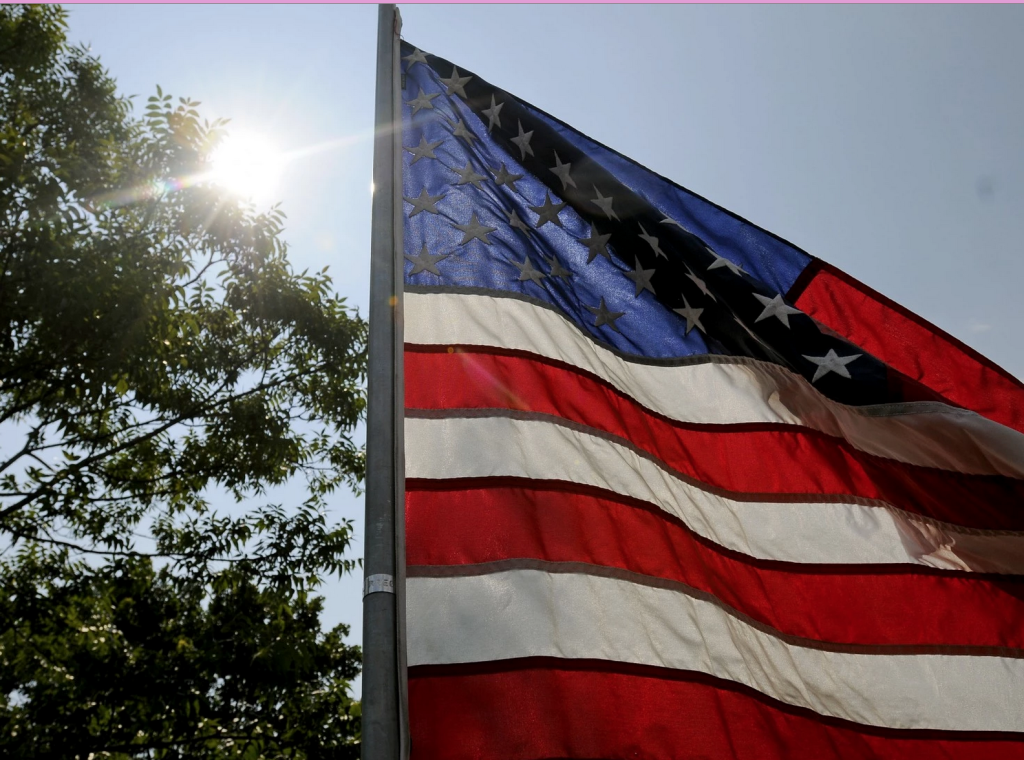
A new survey from the financial services site WalletHub says Alabama is at the top of the heap when it comes to who represents the American red, white, and blue the most proudly. Virginia topped the new survey’s list as the most patriotic state, with Alaska, South Carolina, Colorado, and Georgia rounding out the top five. The firm’s methodology, according to its report Tuesday, used “12 key metrics such as military engagement, voting habits and civic education.” Some interesting asides from the study’s findings: Red states are more patriotic on average. Alaska has the highest number of veterans per 1,000 residents, 100.8, which is two times higher than in New York, the state with the lowest, 45.5. Utah has the highest volunteerism rate, 45.2%, which is three times higher than in Louisiana, the state with the lowest, 18.2%. Minnesota has the highest percentage of residents who voted in the 2012 presidential election, 74.37%, which is two times higher than in Arizona, the state with the lowest, 37.98%. The full report, including survey findings on all 50 states when it comes to their affinity for Uncle Sam, is available here.
John Merrill teams with state Legislature, judges to ensure voter readiness in November
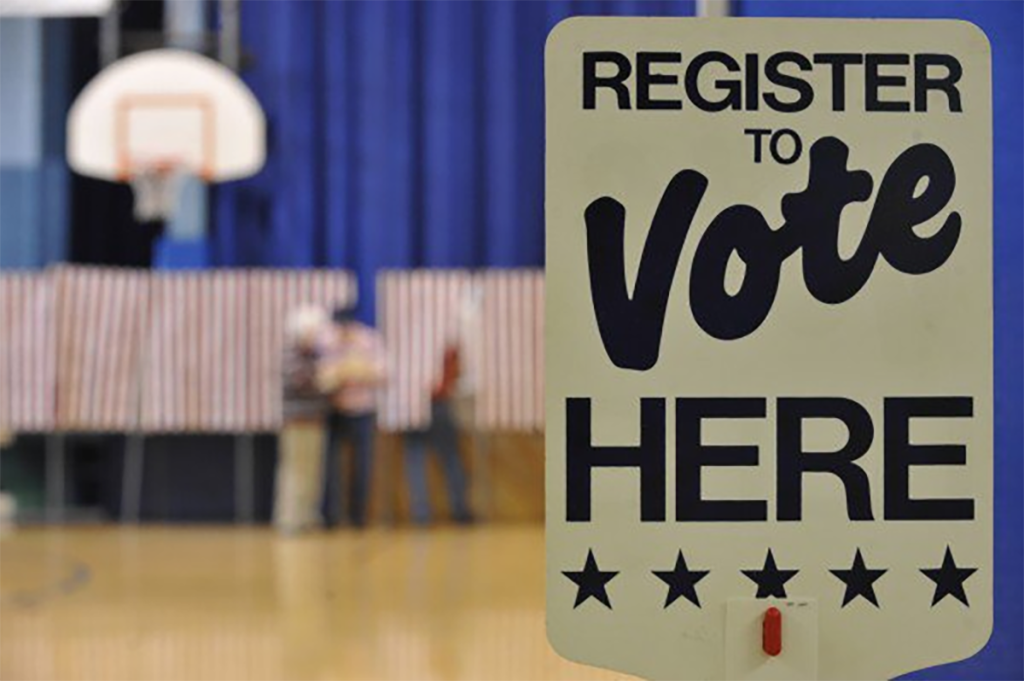
With the November General Election just six months away, Alabama Secretary of State John H. Merrill is doubling down on his efforts to ensure eligible Alabama citizens are able to vote. His latest action — asking the members of the state Legislature, as well as all state Probate Judges to provide three separate and specific days of the week, times, and venues in their respective areas where Merrill’s office may hold a drive for voter registration and photo I.D issuance. The Alabama Secretary of State’s next registration events will be held in: Coosa County May 9, 2016 from 10 a.m. – 12 p.m. West Coosa Senior Center 47 Coosa County Road 70 Sylacauga, AL 35151 Baldwin County May 11, 2016 from 9 a.m. – 11 a.m. Elsanor Community Center 23741 US Highway 90 Robertsdale, AL 36567 Baldwin County May 11, 2016 from 1 p.m. – 3 p.m. Lillian Community Club 34148 Widell Avenue Lillian, AL 36549 Baldwin County May 12, 2016 from 9 a.m. – 11 a.m. Harry Roberts Community House 300 East 16th Avenue Gulf Shores, AL 36542 Since June 3, 2014, to participate in an election, a citizen must be registered to vote and present a valid form of photo ID. Forms of photo ID accepted at the polls are any of the following valid documents: driver’s license; Alabama photo voter ID card; state issued ID (any state); federal issued ID; US passport; employee ID from Federal Government, State of Alabama, County, Municipality, Board, or other entity of this state; student or employee ID from a public or private college or university in the State of Alabama (including postgraduate technical or professional schools); Military ID; or Tribal ID. To receive a free Alabama photo voter ID card, a citizen must be a registered voter and must not have one of the valid forms of photo ID listed above. Examples of non-photo ID documents that can be used in applying for a free Alabama photo voter ID card include a birth certificate, marriage record, Social Security Administration document, hospital or nursing home record, Medicare or Medicaid document, or an official school record or transcript. For information on the site schedule as well as free Alabama voter identification cards, visit www.alabamavoterid.com or call 1-800-274-VOTE.
Here’s what single women are looking for in presidential candidate
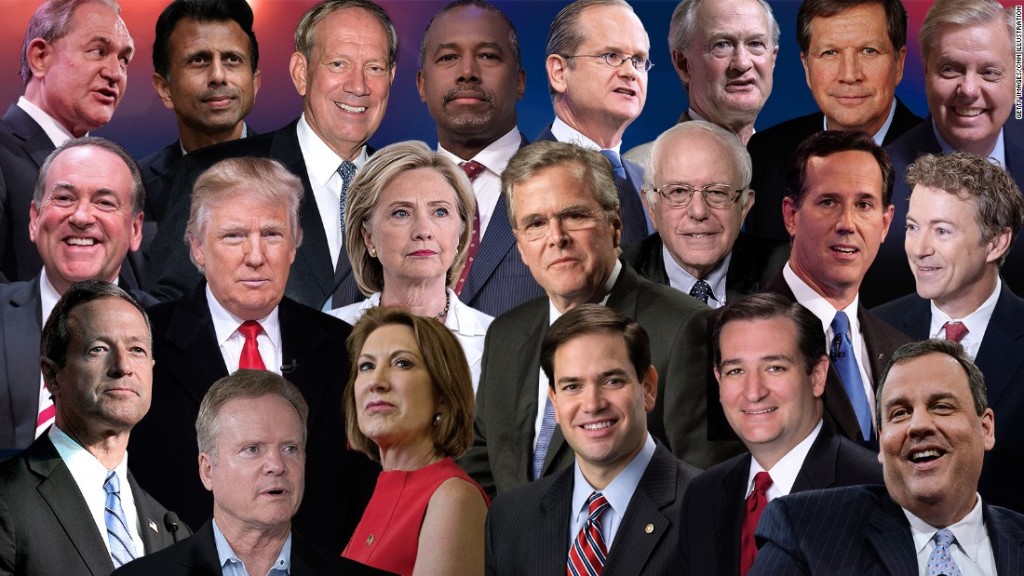
All eyes were on Iowa Monday as the nation’s first political contest of the year garnered national attention with both Republicans and Democrats battling to win the state’s caucuses. Now the campaigns shift their attention to the next battleground states — New Hampshire and South Carolina — where political consultants and staffers are hard at work trying to turn out key voting demographics. One of those is single women. Which begs the question, what exactly is motivating single women to head to the polls in 2016? Perhaps unsurprisingly, reproductive health and equal pay that top the list. According to a new web survey featured in the March issue of Elle magazine, conducted in partnership with the organization American Women, 80 percent of single women would throw their support to a candidate who valued equal pay for equal work, and tax credits and subsidies for child care. Eight in 10 women added, that they’re “much or somewhat more likely” to support a candidate who allows them to “maintain full control over their reproductive health.” “The data revealed what we knew all along,” Kate Black, executive director of American Women told Elle.com. “Women hold political figures, especially presidential candidates, at a higher regard and expect them to hold the highest standards of civility and respect. With presidential primaries approaching in the next few weeks, this data is a worthwhile reminder to all presidential candidates of the influence [that] single women have in deciding elections.” According to the survey, nine out of 10 women they are “almost certain” they’ll show up to vote this year. See more of the findings included in the survey on Elle’s site.
Nancy Pelosi praises Bernie Sanders for energizing young voters
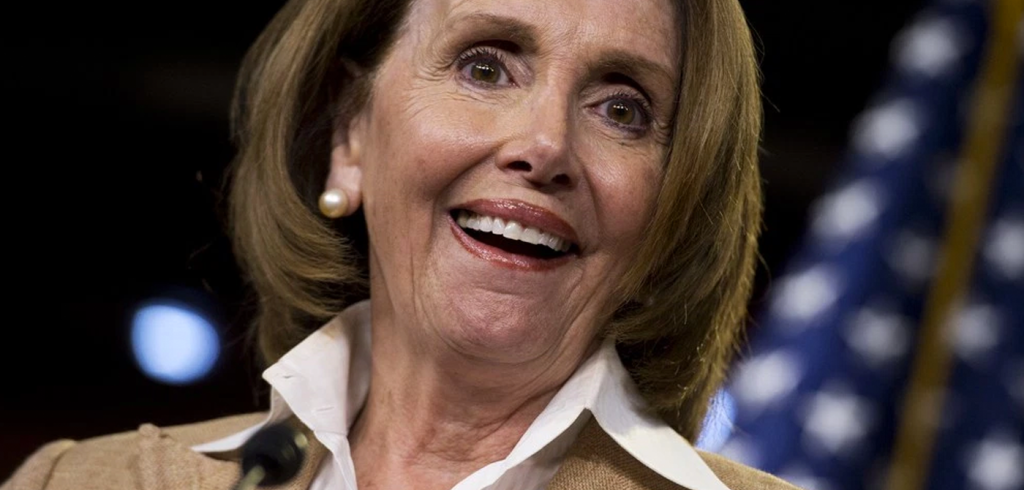
Top House Democrat Nancy Pelosi is praising Vermont Sen. Bernie Sanders for getting more young people “interested in the political process” as he mounts a surprisingly strong race for the Democratic presidential nomination. The California congresswoman says that “history will record that Bernie Sanders’ candidacy has had a very wholesome effect.” Pelosi spoke as House Democrats are closing out a team-building conference aimed at building unity and sharpening the party’s message heading into the November elections. She was responding to a question about whether Sanders’ candidacy will hurt Democrats’ chances this election. Pelosi has steered clear of endorsing a candidate in the party’s three-way primary but is regarded as a supporter of Hillary Clinton. Republished with permission of the Associated Press.
Kenneth Paschal: Should the church community encourage their members to register to vote?
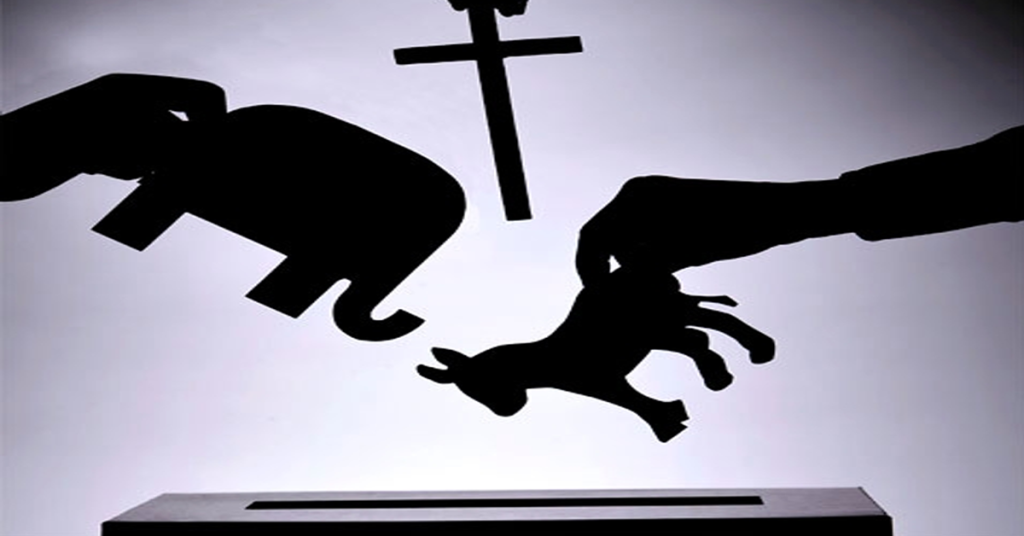
It is our civic duty to register to vote and participate in elections, but many religious leaders hesitate to offer their opinion on the position of the candidates; many won’t allow the church to become involved. Considering pastors preach about gambling, abortion, homosexuality, and other societal issues, it seems necessary that they speak about the direction some candidates wish to take our state and country. As a concerned Christian and single dad wishing to help move our nation towards love and forgiveness in divorce situations, I have done the research and found nothing that would restrict a church from registering voters or supporting legislation that safeguard parental rights from government intrusion. As Paul wrote to the Romans: “Everyone must submit himself to the governing authorities, for there is no authority except that which God has established” (Romans 13:1). We can also look back upon Paul’s letter, and other portions of Scripture, such as; Mark 12:17, I Timothy 2:1-3, Acts 5:29 to determine our own relationship to government. God offers Biblical provision for our modern situation, and I have applied the principles He has given in Hosea 8:4, Exodus 18:21, Proverbs 29:7, Proverbs 21:1, 1 Samuel 16:7, 2 Timothy 3:1-5, Matthew 7:15, Matthew 5:13-16, Matthew 18:6, and 1 John 4:7 in an effort to protect our children from governmental laws that would preclude them from sharing love with both their biological parents. Every day I fight ‘the good fight,’ I bring God’s values to a system that only holds law as valuable. How can love survive, let alone thrive through that without Him? During the Founding Era, the pulpits were one of the primary sources for voting information. Churches were at the center of the political community, not on the periphery. It would make sense to believe the Church is the only way to bring Christian beliefs into focus… going back to an old method so we can step forward into our future with goodness and love. Let’s help each congregation member be a contributor in 2016! Church can make the difference. For more information about registering to vote you can visit the Secretary of State website at alabamavotes.gov and click on “Register to Vote” or contact me at kenneth.paschal@alfra.org. Kenneth Paschal is a child activist, a fit parent, and an advocate for protecting parents’ fundamental rights.
Tom O’Hara: Don’t thank me for my service, just send my disability check
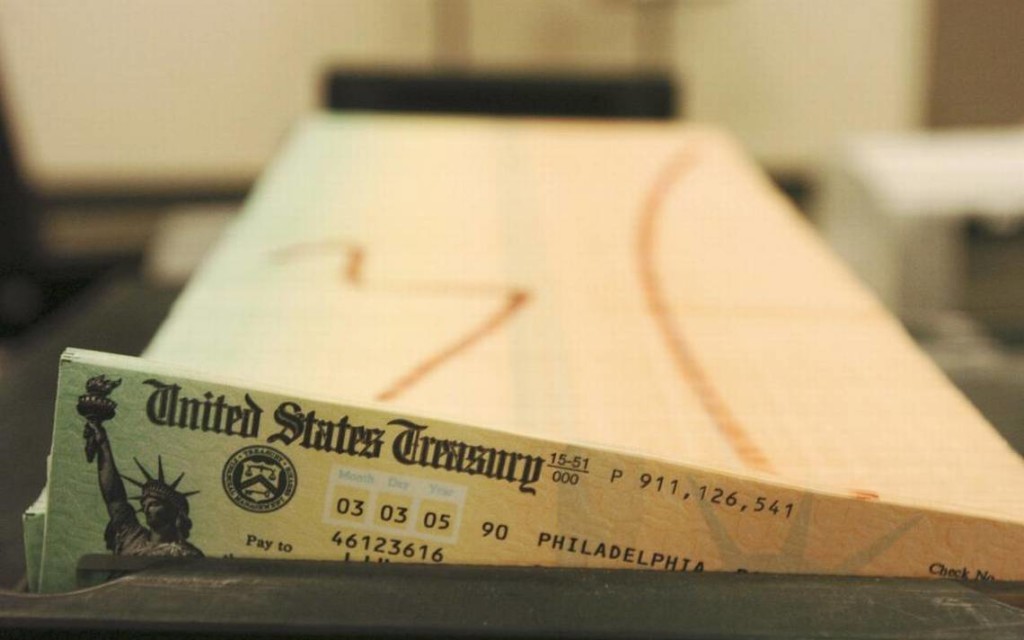
It’s Veterans Day on Wednesday and I’m even more excited than usual. In researching this column, I learned that as a Vietnam veteran I may be eligible to collect VA disability benefits because I have diabetes – even though I’m sure my tedious year at Phu Cat Air Force Base has nothing to do with my blood-sugar levels today. It’s a great time to be a veteran. Gov. Rick Scott and his team are doing everything they can to lure more veterans to Florida. We already have 1.6 million of them here and I doubt they need much coaxing to flee Ohio and New Jersey. Nonetheless, the state has waived out-of-state college fees for vets and offered a buffet of other perks. The college fee waiver is a nifty ruse because few current vets have any interest in getting a college degree. The state has a Department of Veterans Affairs that spends $111 million each year to help more and more vets feed at the government trough. This is very good politics because veterans are overwhelmingly old, white and male. In other words, they vote Republican. And they vote in droves. About 70 percent of America’s 22 million veterans voted in the 2012 presidential election, compared with 56.5 percent of all Americans. Among the vets 65 and older, more than 75 percent cast a ballot. In the 2014 midterm elections, vets voted for Republicans by a 20-percentage-point margin over Democrats in House races, according to The Washington Post. But politicians of every stripe pander to veterans. Even if they don’t vote for you, you sound patriotic and sensitive if you praise them and approve billions of dollars in benefits for them. Veterans account for only 9 percent of the adult population. (I wonder how many people even know a veteran.) Nonetheless, they have extraordinary sway with politicians. Even as the percent of congressmen who served in the military plummets (less than 20 percent today compared with 73 percent in 1971), their urge to throw money at vets escalates. “More than 1.3 million veterans of the Vietnam era received $21 billion in disability pay last year. From Afghanistan and Iraq, the cost was $9.3 billion – but it is growing fast,” the Los Angles Times reported last year. In 1991, the total cost for VA disability payments was $16.6 billion; it’s $50 billion today, the Times reported. Even the Heritage Foundation – a very conservative think tank – is amazed at the exploding veterans largesse. “Nearly 60,000 disabled veterans received cash benefits from three different federal programs simultaneously. More than 2,300 veterans received $100,000 or more in annual benefits each, and the highest annual benefit amounted to more than $200,000,” according to a 2014 foundation article. OK. Where do I sign up? Some guy is getting more than $200,000 by triple dipping into VA disability, military retirement and Social Security disability. And my guess is that he’s a white guy who votes Republican because he’s so disgusted by government waste. I assume this veteran was unperturbed if he had to exaggerate a bit for his benefits. It’s not hard to game the system, however, because it appears VA staff are encouraging the fraud. “A 2014 paper in Psychological Injury and Law identified ‘collusive lying’ between disability-benefits applicants and VA staff as one possible problem” for the soaring costs, according to the Heritage Foundation. Frankly, I’m just jealous. I have not been paying attention. I only recently discovered that you could get a “V” for veteran put on your driver license and get discounts at Home Depot and movie theaters. However, I’m going for the big time now: the diabetes claim. In 2001, the VA added Type 2 diabetes to the list of disabilities. The disease has not been definitely linked to Agent Orange, but veterans groups lobbied to include it, according to the LA Times. “Through 2013, the number of veterans receiving compensation for diabetes climbed from 46,395 to 398,480,” the Times reported. So if you see me on Veterans Day, don’t thank me for my service. Just give me directions to the Veterans Affairs disability claims office so I can get started on my paperwork. Tom O’Hara is a veteran newspaperman. He is the former managing editor of The Palm Beach Post and the Plain Dealer in Ohio.
Alabama business roundup: Headlines from across the state

Can you guess how many AL counties have more registered voters than adult residents? Find out more about a possible new electricity-natural gas utility coming to the Yellowhammer state. What’s happening to AL’s first charter school? And more inside today’s business roundup of headlines from across the state: Alabama Newscenter: Southern Company/AGL Resources deal would create leading U.S. joint electricity-natural gas utility Southern Company and AGL Resources have agreed to a $12 billion deal that would make the natural gas giant a new Southern operating company and puts the electricity company into the growing natural gas business. Alabama Power is a Southern Company subsidiary with 1.4 million customers, 78,000 miles of power lines and 13,000 megawatts of electric generating capacity. Southern Company also owns Southern Power, which owns 3,175 megawatts of natural gas generating capacity in Alabama.The boards of directors of both companies said today they have a definitive merger agreement to create America’s leading U.S. electric and gas utility company. If finalized, AGL Resources will become a new wholly-owned subsidiary of Southern Company. In Alabama, AGL Resources owns a liquefied natural gas facility in Trussville that delivers about 60,000 gallons per day, its first such facility dedicated solely to the merchant market. Southern Company with AGL Resources under its umbrella would create a new electric and natural gas utility with approximately 9 million utility customers in nine states. It is Southern Company’s largest deal to diversify its utility holdings. “As America’s leader in developing the full portfolio of energy resources, we believe the addition of AGL Resources to our business will better position Southern Company to play offense in supporting America’s energy future through additional natural gas infrastructure,” Southern Company CEO Thomas A. Fanning said. “For some time, we have expressed our desire to explore opportunities to participate in natural gas infrastructure development.” Under the terms of the agreement, AGL Resources’ shareholders would receive $66 in cash for each share of common stock, a 36.3 percent increase in this month’s average trading price. Southern Company expects an increase in earnings the first year after the acquisition closes. The new company would become the second-largest utility company in the U.S. with: 11 regulated electric and natural gas distribution companies; 9 million customers with a projected regulated rate base of about $50 billion; Nearly 200,000 miles of electric transmission and distribution lines and more than 80,000 miles of gas pipelines; Generating capacity of about 46,000 megawatts. “With AGL Resources’ experienced team operating premier natural gas utilities and their investments in several major infrastructure projects, this is a natural fit for both companies,” Fanning said. “Moreover, this transaction is expected to position Southern Company to enhance earnings growth while maintaining a strong balance sheet and improving cost-effectiveness.” The Southern Company system is known for regularly outperforming industry peers in reliability, with prices below the national average and the highest customer satisfaction among peer utilities as measured by the Customer Value Benchmark survey. Alabama Power regularly tops such rankings along with other Southern Company operating companies Georgia Power, Mississippi Power and Gulf Power. “AGL Resources’ management team and board of directors wholeheartedly support this transaction, and we believe it will provide new opportunities and enhanced value for our shareholders, customers and employees,” AGL Resources CEO John W. Somerhalder II said. “Importantly, both companies are committed to safely delivering clean, reliable, affordable energy while providing customers with world-class service. The respective models of Southern Company and AGL Resources focus on the fundamental values of safety, operational excellence and environmental stewardship.” Fanning said Southern Company and AGL Resources share a focus on community involvement. “We believe this combination will also advance our customer-focused business model,” he said. “AGL Resources and Southern Company have long been leading corporate citizens and the combined company will further our support of all of the communities we serve.” Somerhalder agreed. “We’ve found a strong partner in Southern Company with its complementary businesses, excellent reputation and shared values,” he said. “They have committed to continuing our tradition of community and philanthropic support and exceptional service to customers. We look forward to working with Southern Company to complete the transaction as expeditiously as possible and ensure a smooth transition.” Birmingham Business Journal: Registered voters outnumber eligible adults in 10 Alabama counties The Public Interest Legal Foundation – a nonpartisan, nonprofit, public-interest law firm that specializes in civil litigation affecting elections, voting and other political processes – recently notified 10 Alabama counties that they have more registered voters than people in the voting age population. Alabama Secretary of State John Merrill confirmed the numbers listed by the group and said that all 10 had more registered voters than people over 18 years of age, according to a report from AL.com. The counties are Lowndes, Perry, Greene, Macon, Wilcox, Marengo, Hale, Washington, Conecuh and Choctaw. Merrill said all 10 counties have seen population decreases since 2010 and some people that previously left the counties still remain registered to vote in their districts. Former Alabama Secretary of State Jim Bennett’s office last year released numbers showing that four Alabama counties had more registered voters than voting age population. The 10 Alabama counties listed by the foundation are among 141 nationwide, according to data from the foundation. Only four other states had more counties on the foundation’s list than Alabama – Michigan (24), Kentucky (18), Illinois (17) and Indiana (11). Here are the continues by number of registered voters and those over the age of 18. Choctaw County, 10,765 registered voters, 10,582 adults Conecuh County, 10,102 registered voters, 9,957 adults Greene County, 7,230 registered voters, 6,561 adults Hale County, 12,042 registered voters, 11,641 adults Lowndes County, 10,230 registered voters, 8,135 adults Macon County, 17,700 registered voters, 15,865 adults Marengo County, 16,108 registered voters, 15,485 adults Perry County, 8,521 registered voters, 7,621 adults Washington County, 13,382 registered voters, 13,048 adults Wilcox County, 9,059 registered voters, 8,341 adults Birmingham Business Journal: Alabama delays first charter school opening until 2017 The first meeting of the Alabama Charter School Commission on Thursday resulted in
Voter registration events set throughout Alabama

The Alabama Secretary of State‘s office says several voter registration events are being hosted in the coming week. The office is hosting a registration event Wednesday at Moody City Hall in St. Claire County. Additional registration drives are being held in Greene County Aug. 22 at the Black Belt Folk Roots Festival and Aug. 25 at the Midland City Town Hall. Each event begins at 10 a.m. Officials say Alabamians must present valid photo ID to participate in elections, which include driver’s licenses, federally issued ID cards, U.S. passports and more. Alabamians may apply for a free photo voter ID if they’re registered to vote, but don’t have a valid form of photo ID. Applicants must provide documentation proving name, date of birth, voter registration and address. Online: www.alabamavoterid.com Republished with permission of The Associated Press.


